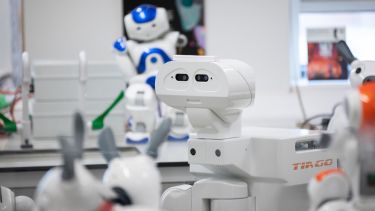Autonomous Systems and Robotics
AI will help to enable a new generation of robots and other autonomous system that have the potential to bring major benefits to society in critical application areas such as health and social care, agriculture, manufacturing and challenging environments. However, the adoption of robots and other autonomous systems will be limited unless they can be shown to be trustworthy, safe and secure.
High-level challenges for autonomous systems research include:
- What methodologies and technologies can we develop to ensure the safety, security and reliability of autonomous systems in critical applications? How can autonomous systems be safeguarded against adversarial attacks?
- How can we build safe and effective collaborative robots to work alongside humans in areas such as manufacturing, agriculture, and medicine? How can we build trust between robotic systems and human co-workers?
Sheffield Robotics
Sheffield has world leading expertise in robotics and autonomous systems.
Sheffield Robotics brings together researchers from across a variety of disciplines and all faculties at the University of Sheffield and from the Advanced Manufacturing Research Centre (AMRC), Sheffield Hallam University and industry, to make Sheffield a leading hub for Robotics research.
Cutting across all research themes Sheffield Robotics promotes an emphasis on responsible research and innovation aligned with our mission to ensure that the transformative impacts of Robotics and Autonomous Systems are properly anticipated and managed.
Their research falls into four themes:
Cyber Physical and Urban Infrastructures - Cyber Physical and Urban Infrastructure is an expression of this next generation of connected tools that will power societal and economic outcomes for our future
Health and Social Care - In partnership with CATCH, Medical AMRC, Advanced Wellbeing Research Centre at Sheffield Hallam University and working with regional NHS and social care providers. Sheffield Robotics creates innovative robotic platforms and systems for healthcare and assistive living.
Manufacturing Robotics - Sheffield Robotics has a portfolio of research applicable to advanced manufacturing, specifically in relation to robotic control, human-robot and robot-robot collaboration and autonomous manufacturing. Sheffield Robotics is building collaborations with the AMRC, Nuclear AMRC and industry partners.
Trustworthy Autonomous Systems - Identifying conflict and confluence in stakeholder imaginaries of autonomous care systems.
To find out more about research on robotics and autonomous systems, facilities and equipment visit:
Visit Sheffield Robotics

